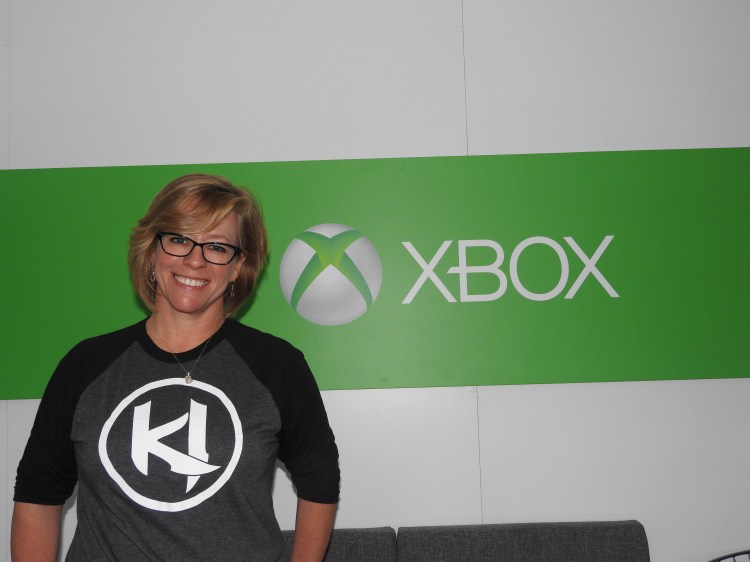GamesBeat: What else has been getting attention?
Loftis: Halo 5 was a big headline, particularly War Zone, the massively multiplayer new mode for Halo 5. It really resonates. Especially now that people are getting their hands on it, they’re coming out with a super positive impression and a lot of enthusiasm for the game.
GamesBeat: It was fun. It felt MOBA-like — as in a multiplayer online battle arena game like League of Legends — in that you have to accomplish goals and move forward.
Loftis: It does have an interesting MOBA-meets-sandbox feel to it, with the wide-open playing field. Personally I’m less skilled in the multiplayer arena, but I love the campaigns. I’ve been following the media releases. Of course, I have friends at 343, but I’ve asked them not to spoil it.
GamesBeat: I was spawning Warthogs and driving out there and getting them killed and leaving the Warthog for the enemy to take, over and over. Supplying Warthogs to the other team. But no, it was cool. Gears of War 4, too.
Loftis: Lots of excitement about Gears of War. The promise that the franchise is going to continue to deliver on those incredibly high-fidelity visuals, as well as the cover mechanics and super-disgusting creatures. I mean that in the best possible way. There was a great reaction to that. People seem to really—maybe this is just me reading my own emotions into it, but Rare Replay, bringing back a lot of the games we grew up playing—I think there’s a strong nostalgia surge right now. Gamers are growing up and begetting gamers. You want to share some of your early experiences with your kids and return to them yourself. It’s such a good deal, too.
GamesBeat: It seems like there’s this choice that publishers and developers have to make. Should I do classics? Should I do reboots? Should I do something brand new? You have audiences for all of those options.
Loftis: Choice is good. Returning to Phil’s mantra of gamers at the center of everything we do, that’s the number one thing. They want variety and choice. They want a broad spectrum of options for gaming.
GamesBeat: What do you think your focus as a first party should be, then? Do you still want to deliver variety, or do you count on third parties for that? Is it a mix of those? What distinguishes you?
Loftis: We serve as the canvas for the platform to push and try out new features and define new features. We work very closely with the platform team to listen to gamers and try to think about what features we should implement. We get them into first-party games to prove them out, to prove to gamers that this is a fun place to play, and to prove to developers that it’s worthwhile to make games for Xbox.
We are going after variety. Obviously we have our tentpole franchises — Halo, Forza, Fable, Gears of War, Minecraft. But we are constantly seeking new IP. ReCore is a game we teased during the keynote. At Gamescom we’ll be diving more into future titles and new IP — Quantum Break, Crackdown, Scalebound.
GamesBeat: There’s a fair amount of strong women in your games now.
Loftis: Gamers form the deepest bonds with the content and have the most immersive and engaged experiences when they have something they can relate to on the screen. Adding a more diverse array of characters invites a more diverse set of gamers. Making gaming more inclusive is good for everybody – good for gamers, good for developers, good for people in general.
GamesBeat: People have been figuring out that some of the most popular games ever have had women in the lead.
Loftis: That’s right. Lara Croft is someone I’ve identified strongly with for years now. Player choice is another thing. The more we give people the opportunity to customize their experiences to suit their tastes, that’s great.
GamesBeat: It seems like graphics was a limitation in the past. Now there isn’t any technical obstacle to offering those choices.
Loftis: I’m blown away by the way games look and play in this generation of consoles. Especially now, adding cloud compute power, it expands our ability to deliver experiences to consumers.



